Articles
- Page Path
- HOME > J Korean Acad Nurs > Volume 42(6); 2012 > Article
-
Original Article
- Meta-Analysis of Spiritual Intervention Studies on Biological, Psychological, and Spiritual Outcomes
- Pok-Ja Oh, Young-Hyun Kim
-
Journal of Korean Academy of Nursing 2012;42(6):833-842.
DOI: https://doi.org/10.4040/jkan.2012.42.6.833
Published online: December 31, 2012
1Department of Nursing, Sahmyook University, Seoul, Korea.
2Department of Nursing, Graduate School, Sahmyook University, Seoul, Korea.
- Address reprint requests to: Oh, Pok-Ja. Department of Nursing, Sahmyook University, Hwarangro-815, Nowon-gu, Seoul 139-742, Korea. Tel: +82-2-3399-1589, Fax: +82-2-3399-1594, ohpj@syu.ac.kr
© 2012 Korean Society of Nursing Science
- 1,032 Views
- 8 Download
- 21 Crossref
Abstract
-
Purpose
- The purpose of this study was to evaluate the effectiveness of spiritual intervention studies by examining biological, psychological, and spiritual outcomes.
-
Methods
- From electronic databases 2522 studies were retrieved, of which 21 studies met the inclusion criteria. These studies had 1411 participants. Two authors independently extracted data from the selected studies and assessed the methodological quality. The data were analyzed using the RevMan 5.1 program of the Cochrane library.
-
Results
- Overall effect size of spiritual intervention on spiritual and psychological (depression and anxiety) outcomes were moderate (d=-0.65 to d=-0.76, p<.001). The effects on biological outcomes (pain and functional status) ranged from -0.51 to -0.39, respectively. No publication bias was detected as evaluated by a funnel plot. Spiritual intervention had a moderate effect on psychological and spiritual outcomes and a smaller effect on biological outcomes.
-
Conclusion
- The results of this study suggest that spiritual intervention can relieve depression and anxiety. Further randomized controlled trials studies are needed to evaluate the effects of spiritual intervention on biological outcomes.
- 1. Altman DG, Schulz KF, Moher D, Egger M, Davidoff F, Elbourne D, et al. The revised CONSORT statement for reporting randomized trials: Explanation and elaboration. Ann Intern Med. 2001;134(8):663–694.ArticlePubMed
- 2. Chung JS. Effects of spiritual nursing care on spiritual well-being, depression, anxiety and pain in terminal patients with cancer. 2005;Gwangju, Chonnam National University. Unpublished doctoral dissertation.
- 3. Cohen J. Statistical power analysis for the behavioral sciences. 1988;2nd ed. Hillsdale, NJ, Lawrence Erlbaum Associates.
- 4. Goedendorp MM, Gielissen MF, Verhagen CA, Bleijenberg G. Psychosocial interventions for reducing fatigue during cancer treatment in adults (Review). Cochrane Database Syst Rev. 2009;(1):CD006953. http://dx.doi.org/10.1002/14651858.CD006953.
- 5. Highfield ME. Providing spiritual care to patients with cancer. Clin J Oncol Nurs. 2000;4(3):115–120.PubMed
- 6. Jang SY, Park JS. The meta-analysis of the effect of acupressure for nausea and vomiting in cancer patients receiving chemotherapy. J Korean Oncol Nurs. 2011;11(2):116–126.ArticlePDF
- 7. Jeong IS. Evaluation of methodological quality in evidence based practice. Evidence based oncology nursing. In: Symposium conducted at the meeting of the 12th Congress of Korean Oncology Nursing Society; 2012, January; Seoul.
- 8. Kang JH. The effect of spiritual care intervention on the quality of life of cancer patients. 2001;Seoul, The Catholic University of Korea. Unpublished master's thesis.
- 9. Kaplar ME, Wachholtz AB, O'Brien WH. The effect of religious and spiritual interventions on the biological, psychological, and spiritual outcomes of oncology patients: A meta-analytic review. J Psychosoc Oncol. 2004;22(1):39–50.
- 10. Kim MY, Oh PJ. Meta-analysis of the effectiveness on foot-reflexo-massage for cancer patients. J Korean Oncol Nurs. 2011;11(2):127–135.ArticlePDF
- 11. Kim SY, Park JE, Seo HJ, Lee YJ, Son HJ, Jang BH, et al. NECA's guidance for undertaking systematic reviews and meta-analyses for intervention. 2011;Seoul, National Evidence-based Healthcare Collaborating Agency.
- 12. Koenig HG. Religion, spirituality, and medicine: Research findings and implications for clinical practice. South Med J. 2004;97(12):1194–1200.ArticlePubMed
- 13. Lee J, Han MS, Chung YH, Kim JS, Choi JS. Effects of foot reflexology on fatigue, sleep and pain: A systematic review and meta-analysis. J Korean Acad Nurs. 2011;41(6):821–833. http://dx.doi.org/10.4040/jkan.2011.41.6.821.ArticlePubMed
- 14. Oh PJ, Kang KA. Spirituality: Concept analysis. J Korean Acad Nurs. 2000;30(5):1145–1155.ArticlePDF
- 15. Oh SS. Meta-analysis: Theory and practice. 2009;Seoul, Konkuk University Press.
- 16. Taylor EJ. Spiritual care: Nursing theory, research, and practice. 2002;Upper Saddle River, NJ, Prentice Hall.
- 17. Tiew LH, Creedy DK. Integration of spirituality in nursing practice: A literature review. Singap Nurs J. 2010;37(1):15–22.
- 18. Seeman TE, Dubin LF, Seeman M. Religiosity/spirituality and health: A critical review of the evidence for biological pathways. Am Psychol. 2003;58(1):53–63. http://dx.doi.org/10.1037/0003-066X.58.1.53.ArticlePubMed
- 19. Shelly JA, Miller AB. Called to care: A christian theology of nursing. 1999;Downers Grove, IL, Intervarsity Press.
- 20. Song MO. Effect of spiritual nursing intervention on spiritual well-being and depression of the hospice patients. 2003;Daegu, Keimyung University. Unpublished master's thesis.
- 21. Yoon MO. The effect of spiritual nursing intervention on the meaning of life and spiritual distress of the terminal cancer patients. J Res Inst Hosp Palliat Care. 2004;8:54–67.
REFERENCES
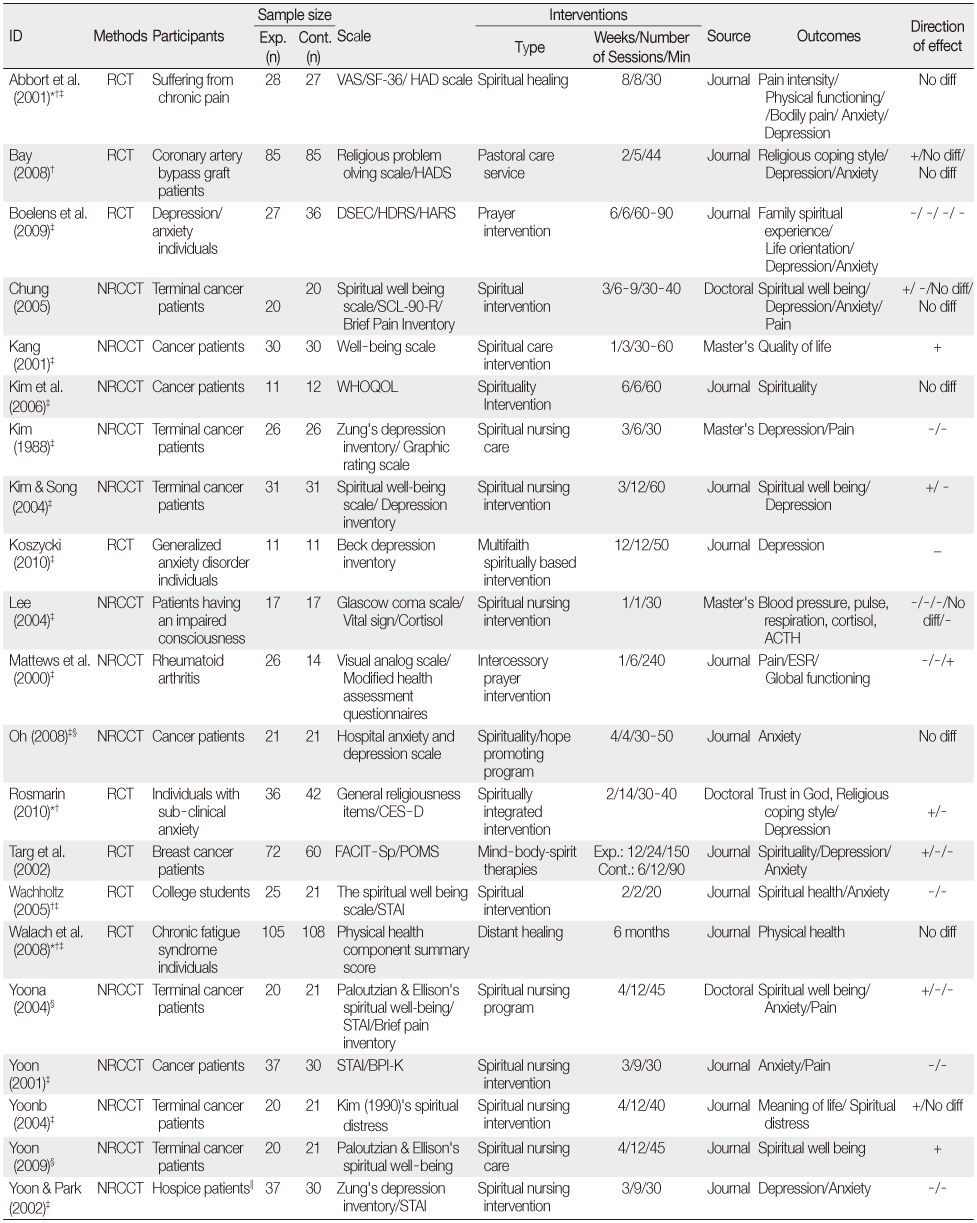
Exp.=Experimental group; Cont.=Control group; diff=difference; RCT=Randomized Controlled Trials; NRCCT=Non Randomized Controlled Clinical Trials; VAS=Visul Analog Scale; HADS=Hospital Anxiety and Depression Scale; DSEC=Daily Spiritual Experiences Scale; HDRS=Hamilton Depression Rating Scale; HARS=Hamilton Anxiety Rating Scale; SCL-90-R=Symptom Check List-90-Revision; CES-D=Center for Epidemiological Studies Depression Scale; FACIT-Sp=Functional Assessment of Chronic Illness Therapy-spiritual; POMS=Profile of Mood States; STAI=Spielberger's State Anxiety Inventory; BPI-K=Korean Version of Brief Pain Inventory.
*Allocation concealment; †Blind stated; ‡<20% Attrition rate; §Calculation of sample size; ∥80% of the people are cancer patients).
Figure & Data
REFERENCES
Citations

- Effectiveness of Interventions on Death Anxiety and Fear in Adults with Chronic Disease: A Systematic Review and Meta-Analysis of Randomized Controlled Trials
Merve Gulbahar Eren, Kübra Üçgül, Havva Sert
OMEGA - Journal of Death and Dying.2025; 91(4): 2007. CrossRef - Effects of counselling and spiritual care program on anxiety in patients with chronic diseases: A systematic review and meta-analysis
Nader Salari, Mohsen Kazeminia, Alireza Abdi, Amir Abdolmaleki, Nasrin Abdoli, Masoud Mohammadi, Shamarina Shohaimi
Current Psychology.2023; 42(12): 9943. CrossRef - The development of a Cancer Pain Belief Modification Program for patients with oral cancer in China: a feasibility study
Rongna Wang, Xiaoyan Zheng, Xixi Su, Xiuyu Huang, Huangju Liu, Yulai Guo, Ji Gao
BMC Nursing.2023;[Epub] CrossRef - The Effects of Spiritual Well-being on Self-care Practices in People Undergoing Hemodialysis: The Mediating Effect of Hope
Bu Kyung Kim, Pok-Ja Oh
Korean Journal of Adult Nursing.2022; 34(6): 592. CrossRef - Abriendo nuevas puertas: Relevancia clínica de integrar la religión y la espiritualidad en la disciplina de la psicología
Orlando M. Pagan-Torres Ponce
Revista Puertorriqueña de Psicologia.2022; 33(2): 258. CrossRef - The Mediating Effect of Depression on the Relationship between Social Support, Spirituality and Burnout in Family Members of Patients with Cancer
Won-Hee Jun, Kyung-Sook Cha, Kee-Lyong Lee
International Journal of Environmental Research and Public Health.2021; 18(4): 1727. CrossRef - Spirituality, religiousness, and mental health: A review of the current scientific evidence
Giancarlo Lucchetti, Harold G Koenig, Alessandra Lamas Granero Lucchetti
World Journal of Clinical Cases.2021; 9(26): 7620. CrossRef - Analysis of Spiritual Care Experiences of Acute-Care Hospital Nurses
Ga Eon Lee, KyoungMi Kim
The Korean Journal of Hospice and Palliative Care.2020; 23(2): 44. CrossRef - The Effect of Religion Intervention on Life Satisfaction and Depression in Elderly with Heart Failure
Alireza Abdi, Askar Soufinia, Milad Borji, Asma Tarjoman
Journal of Religion and Health.2019; 58(3): 823. CrossRef - Initial Assessment and Care Planning in Palliative Hospice Care: Focus on Assessment Tools
Eun Ju Park, Su Jin Koh, Jae Kyung Cheon
The Korean Journal of Hospice and Palliative Care.2019; 22(2): 67. CrossRef - Experience of Cancer Patients Receiving Spiritual Nursing Care in one Christian General Hospital
Eun Youngi Seo, Suhye Kwon, Youngkyoung Kim, ALeum Han
Asian Oncology Nursing.2019; 19(3): 179. CrossRef - Complementary religious and spiritual interventions in physical health and quality of life: A systematic review of randomized controlled clinical trials
Juliane Piasseschi de Bernardin Gonçalves, Giancarlo Lucchetti, Paulo Rossi Menezes, Homero Vallada, Gianni Virgili
PLOS ONE.2017; 12(10): e0186539. CrossRef - Panorama das pesquisas em ciência, saúde e espiritualidade
Alexander Moreira-Almeida, Giancarlo Lucchetti
Ciência e Cultura.2016; 68(1): 54. CrossRef - Spirituality is associated with better prostate cancer treatment decision making experiences
Michelle A. Mollica, Willie Underwood, Gregory G. Homish, D. Lynn Homish, Heather Orom
Journal of Behavioral Medicine.2016; 39(1): 161. CrossRef - Validity and Reliability of Korean Version of the Spiritual Care Competence Scale
Mi Ja Chung, Youngrye Park, Young Eun
Journal of Korean Academy of Nursing.2016; 46(6): 871. CrossRef - Influence of Self-esteem, Empathy and Existential Well-being on Spiritual Care Competence in Nursing Students
Jin Kim, Sookyung Choi
Journal of Korean Academy of Fundamentals of Nursing.2015; 22(3): 328. CrossRef - Religious and spiritual interventions in mental health care: a systematic review and meta-analysis of randomized controlled clinical trials
J. P. B. Gonçalves, G. Lucchetti, P. R. Menezes, H. Vallada
Psychological Medicine.2015; 45(14): 2937. CrossRef - The Effects of Spiritual Interventions in Patients With Cancer: A Meta-Analysis
Pok-Ja Oh, Soo Hyun Kim
Oncology Nursing Forum.2014; 41(5): E290. CrossRef - Association between Spiritual Well-Being and Pain, Anxiety and Depression in Terminal Cancer Patients: A Pilot Study
Yong Joo Lee, Chul-Min Kim, John A. Linton, Duk Chul Lee, Sang-Yeon Suh, Ah-Ram Seo, Hong-Yup Ahn
The Korean Journal of Hospice and Palliative Care.2013; 16(3): 175. CrossRef - Meta-analysis of Psychosocial Interventions to Reduce Pain in Patients with Cancer
Pok Ja Oh, Suk Jung Han
Journal of Korean Academy of Nursing.2013; 43(5): 658. CrossRef - Effect of Intervention Programs for Improving Maternal Adaptation in Korea: Systematic Review
Hee Sun Kang, Soo Young Yeom, Eun-Young Jun
Korean Journal of Women Health Nursing.2013; 19(3): 153. CrossRef
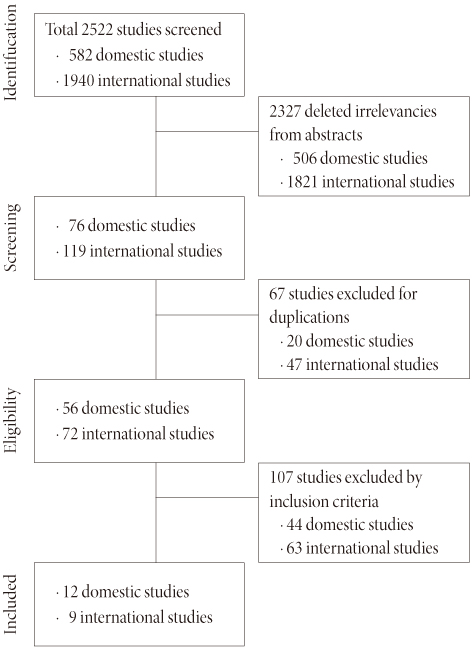
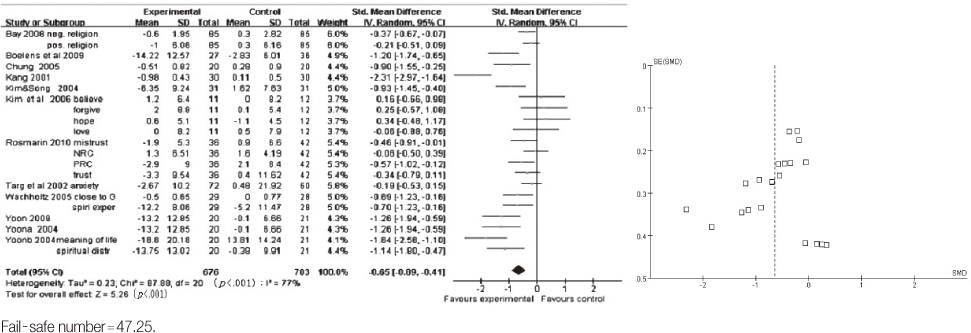
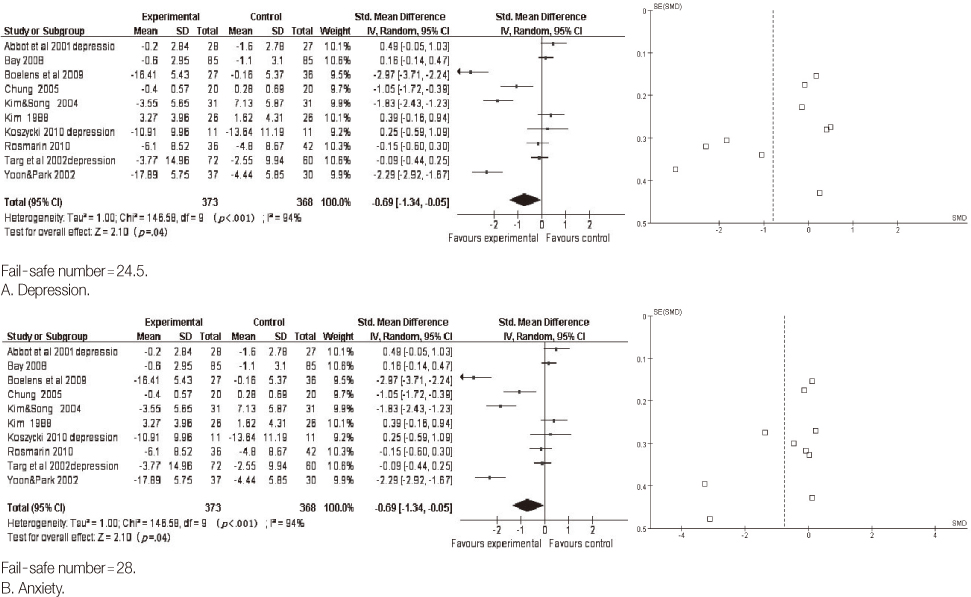
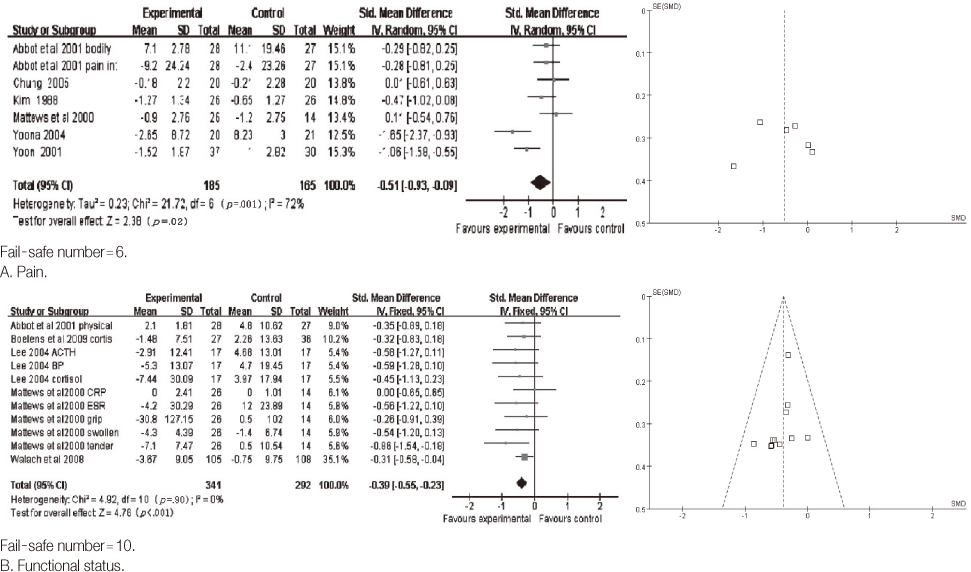
Figure 1
Figure 2
Figure 3
Figure 4
Characteristics of Included Studies (N=21)
Exp.=Experimental group; Cont.=Control group; diff=difference; RCT=Randomized Controlled Trials; NRCCT=Non Randomized Controlled Clinical Trials; VAS=Visul Analog Scale; HADS=Hospital Anxiety and Depression Scale; DSEC=Daily Spiritual Experiences Scale; HDRS=Hamilton Depression Rating Scale; HARS=Hamilton Anxiety Rating Scale; SCL-90-R=Symptom Check List-90-Revision; CES-D=Center for Epidemiological Studies Depression Scale; FACIT-Sp=Functional Assessment of Chronic Illness Therapy-spiritual; POMS=Profile of Mood States; STAI=Spielberger's State Anxiety Inventory; BPI-K=Korean Version of Brief Pain Inventory.
*Allocation concealment; †Blind stated; ‡<20% Attrition rate; §Calculation of sample size; ∥80% of the people are cancer patients).
Characteristics of Spiritual Intervention Studies (N=21)
Exp.=Experimental group; Cont.=Control group.
Exp.=Experimental group; Cont.=Control group; diff=difference; RCT=Randomized Controlled Trials; NRCCT=Non Randomized Controlled Clinical Trials; VAS=Visul Analog Scale; HADS=Hospital Anxiety and Depression Scale; DSEC=Daily Spiritual Experiences Scale; HDRS=Hamilton Depression Rating Scale; HARS=Hamilton Anxiety Rating Scale; SCL-90-R=Symptom Check List-90-Revision; CES-D=Center for Epidemiological Studies Depression Scale; FACIT-Sp=Functional Assessment of Chronic Illness Therapy-spiritual; POMS=Profile of Mood States; STAI=Spielberger's State Anxiety Inventory; BPI-K=Korean Version of Brief Pain Inventory. *Allocation concealment; †Blind stated; ‡<20% Attrition rate; §Calculation of sample size; ∥80% of the people are cancer patients).
Exp.=Experimental group; Cont.=Control group.
 KSNS
KSNS
 E-SUBMISSION
E-SUBMISSION




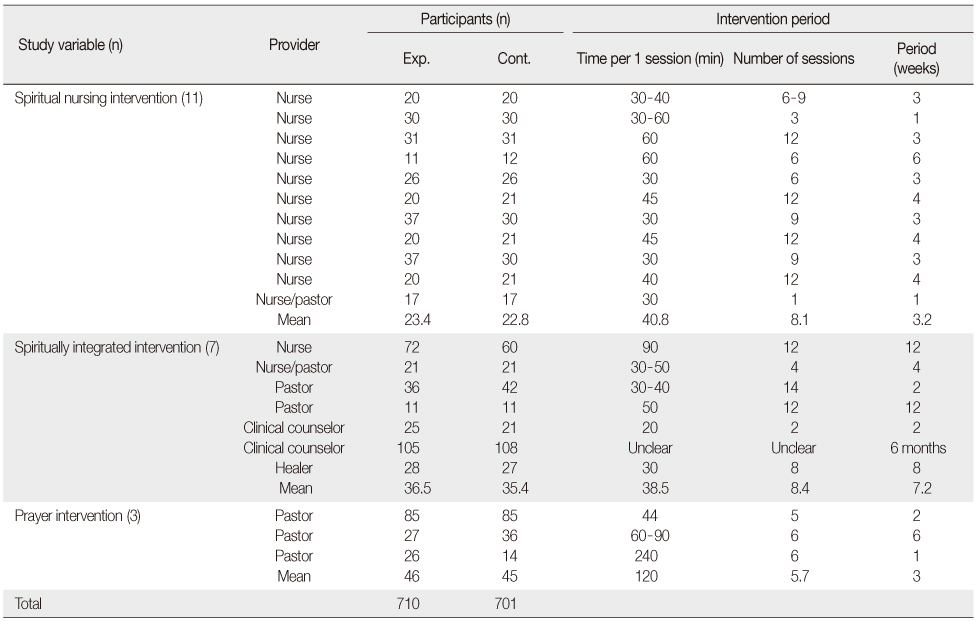
 Cite
Cite

